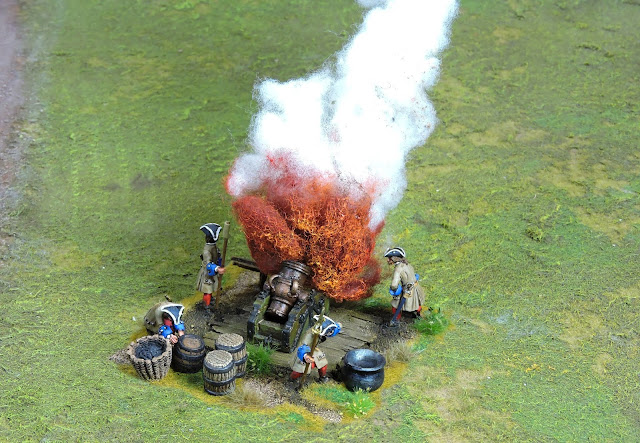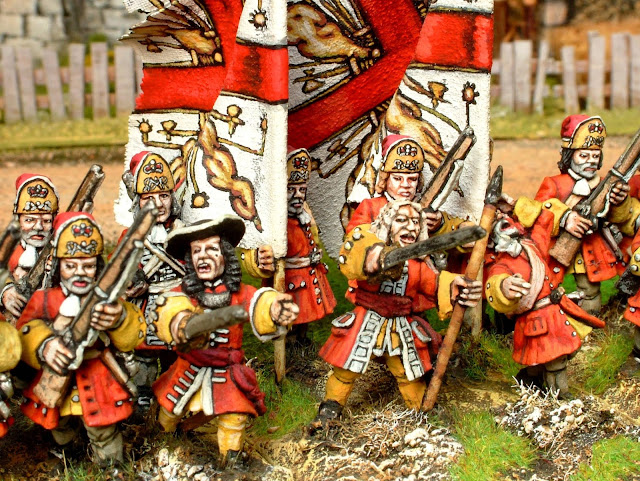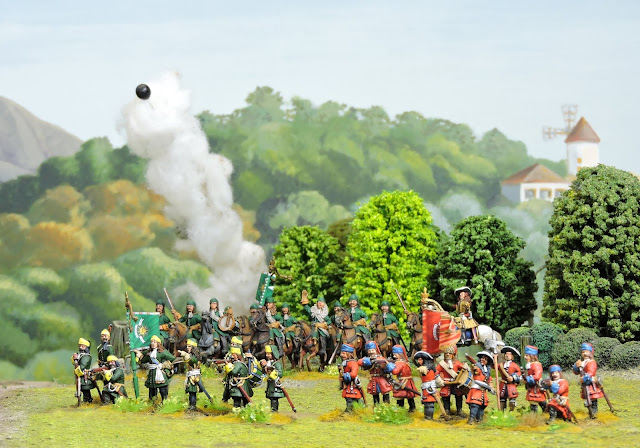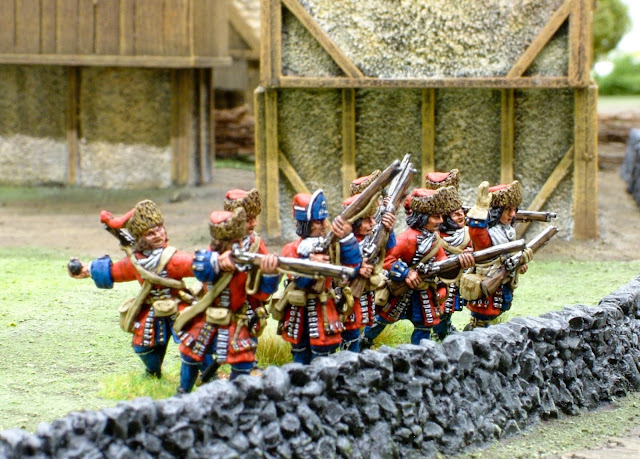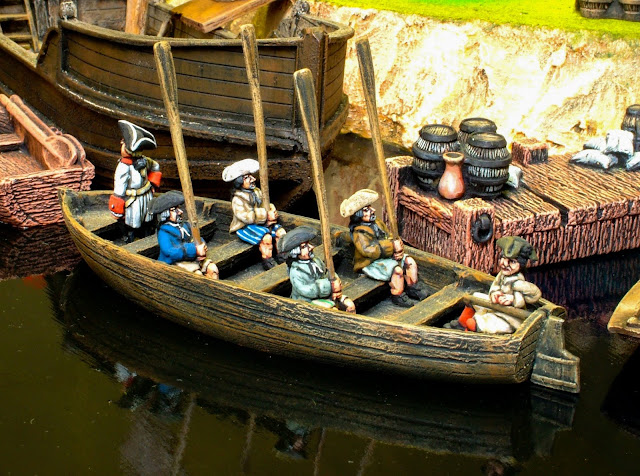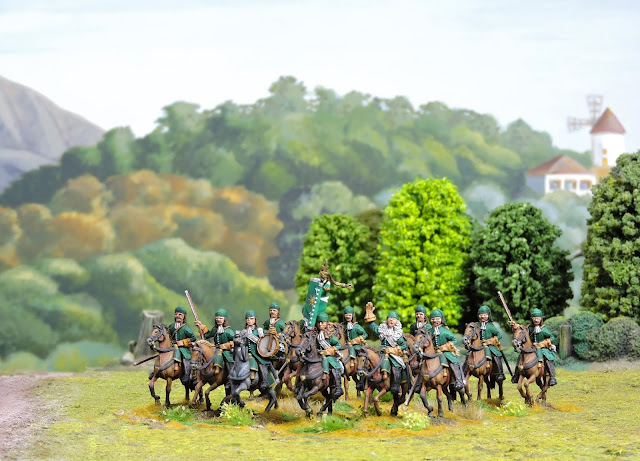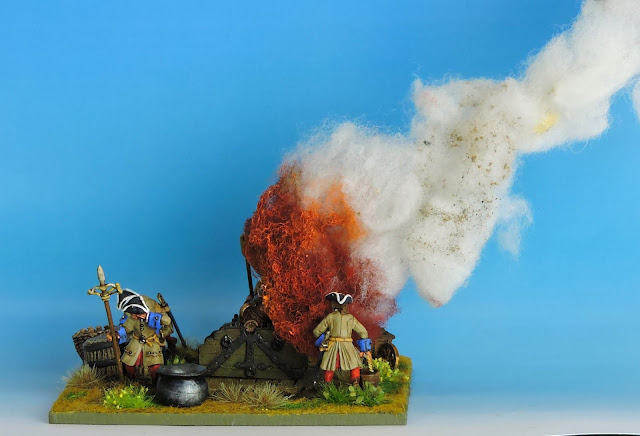Orders of Battle
The full English order
of battle is as follows:
1 battalion of converged grenadiers (all musket), 2
battalions of Marines (all musket), 1 battalion of Guards, 11 battalions of
Foot (pike and musket with the possibility that 3-4 could be all musket armed).Here are the battalions which participated in the expedition:
1st Foot Guards
John Cutts’ Regiment
Richard Coote’s Regiment
Samuel Venner’s Regiment
Marquis de Rada’s Regiment
Sir David Colyear’s Regiment
Thomas Erle’s Regiment (one of two)
Henry Rowe’s Regiment
Ferdinando Hasting’s Regiment
William Stueart’s Regiment
The French order of battle around Camaret Bay could look as
follows:
1 battalion of Marines (all musket), 4 battalions of
infantry (pike and musket), 3 regiments of Horse, 1 regiment of Dragoons, 1
battalion of Militia. 3-5 field guns in various positions. At least half of the
infantry could be in hard cover or entrenchments.
Skirmish gaming
possibilities
Camaret offers magnificent scope for skirmish gaming high
adventure. I of course have Donnybrook in mind when offering these ideas as the
rules were created precisely for this period and this kind of game. Consider
the following options around which to build a scenario;
Take and hold
Several groups of English grenadiers must disembark in the
shallows, storm a French redoubt containing a field gun, plant the English flag
in the objective and then hold it against counterattacks for a set number of
turns. The English should outnumber the French 2:1 in the initial phases of the
game. The French can receive drip fed reinforcements and work up to a possible
counter attack. The English in the defensive phase could receive further
reinforcements from the water’s edge.
Save the General!
General Tollemache has charged up the beach with some of his
boldest grenadiers and in so doing has placed himself in the gravest danger. He
is struck by a cannon ball and falls terribly wounded within the first line of
French positions. His retinue and reinforcements from newly landed boats must
protect the General and carry him back to his transport so that he can be rowed
to safety. The General will require two unarmed men to carry him and they will
do so moving at variable speed no greater than half of the normal move distance
per turn. The forces should be roughly evenly matched from the game
commencement with random reinforcements for each side. The game is over if
Tollemache is saved, killed or captured.
Drive them into the
sea!
The English are disorganized and demoralized along a stretch
of shoreline in Camaret Bay. They must either; try and pull together and
advance or, retreat back to their boats and row for the safety of their fleet.
French Horse and Marines are poised to counter charge and sweep them back into
the sea. Place several groups of English grenadiers behind rocks, shattered
boats or abandoned enemy defence works and allow the French a 2:1 advantage.
The English should be set parameters to extricate their survivors with a win
set at around half or more escaping.
In setting the quality levels for each side remember that
the English grenadiers should have high quality with the French being in the
main regular troop quality with the possibility of some militia or elite groups
among them.
Stellar cast of
characters
There is a wonderful opportunity to incorporate plenty of
Hero characters. Another good option would be to provide close in naval support
from the Marquis of Caernarfon in his super-fast yacht the Peregrine. The madcap nobleman could become a wildcard character in
the amphibious operations. There is also a chance to roll in a star studded
cast of other personalities including Brigadier
John Cutts considered by some as a fearless and inspiring warrior
impervious to personal risk and by others as a dangerous psychopath who is
likely to get everyone around him killed. He has already been wounded almost
fatally, several times in his career. At 33 years old he is at the peak of his
physical prowess and has a deep loathing of the enemy which drives him to acts requiring
nerves of steel. Mestre de Camp Le Comte
de Servon, Brigadier of Infantry Sieurs
de Vaise and Brigadier of Horse Du
Plessis all seem to have been near or involved in the hand to hand combat
on the beach and Le Marquis de Langeron was
leading the French marines. There is of course the tantalising possibility that
the great Vauban himself strays too
near to the action and is captured or killed by the English attack!
Have a look
I strongly recommend a visit to Google Maps. Search
Camaret-sur Mer, Brittany. Switch the view to Earth and zoom in on the area of
Camaret Bay. The long sand/shingle strip where Tollemache landed is still
clearly visible as are several of the Vauban positions built in the area. Note
also the narrows ‘Goulet’ through which the Dutch and English ships had
originally intended to sail to reach Brest. The crescent shaped bay in the open
sea is where the armada dropped anchor and disembarked the English troops. The
sketch map provided is drawn from a very accurate 1780 watercolour print made
in France with the position of the entrenchments, forts, batteries and defences
all meticulously marked and to scale.
Conclusion
I have provided a non-prescriptive map to aid with planning
a potential scenario but have deliberately avoided army lists and set up
positions as there are so many possibilities beckoning from this little
remembered but historically significant chapter in the great struggle against
Louis XIV.
Bonne
chance mes amis anglais à l'enfer qui est Camaret!

